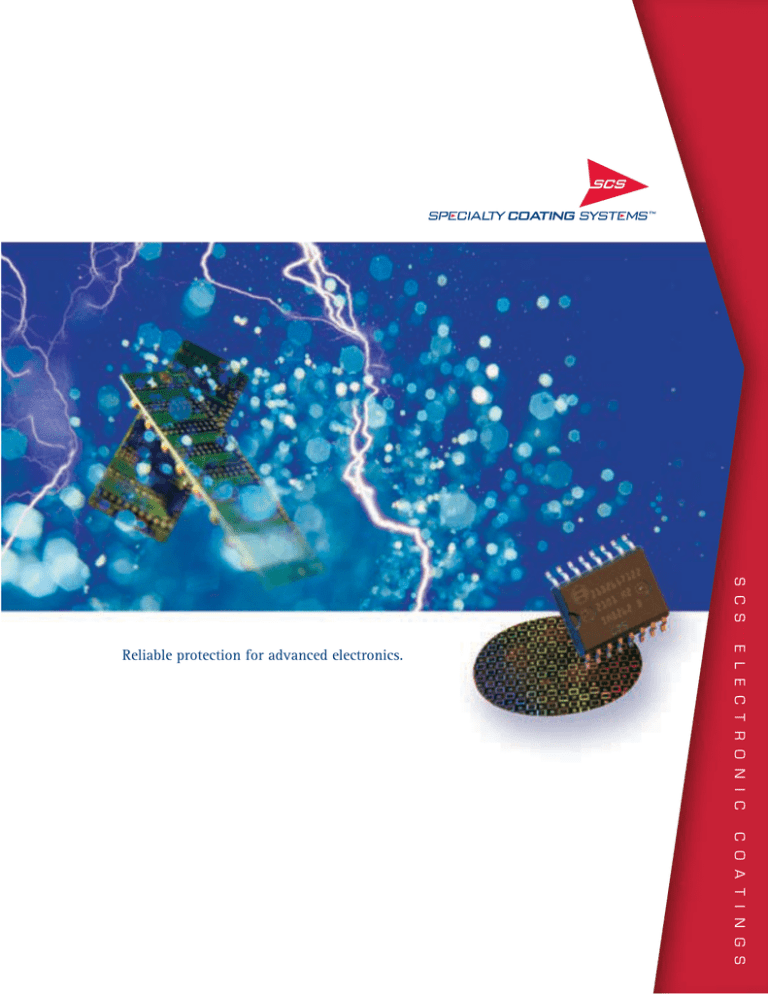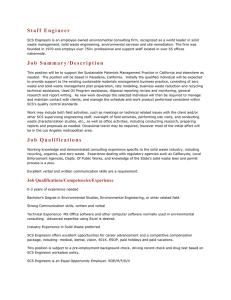
S C S
E L E C T R O N I C
Reliable protection for advanced electronics.
C O A T I N G S
Specialty Coating Systems is the global leader in delivering Parylene conformal
coating solutions for advanced technologies. For more than four decades,
customers have turned to SCS for the planning, development, engineering and
applying of thin-film Parylene polymer coatings to their critical components.
A team of the world’s foremost Parylene specialists, strict quality control
systems, and state-of-the-art coating facilities across the Americas, Asia
and Europe ensure SCS customers receive the most innovative, precise and
consistent coating processes . . . for components and applications where
compromise is not an option.
No matter the end use, electronic components must
meet a complex and exacting set of specifications
to ensure reliability and a trouble-free life. SCS
provides innovative solutions for
protecting advanced technologies
in many environments and
industries, including electronics,
automotive, military and medical.
SCS Parylene Coatings
Ultra-thin and pinhole-free, SCS Parylene coatings
offer exceptional properties for electronic component
protection. SCS combines the properties of Parylene
with its years of experience, vast technology and
worldwide resources to provide Parylene coatings
and services you can rely on, including Parylene HT®,
specifically engineered to withstand the most extreme
conditions in the industry.
The benefits of SCS Parylene coatings include:
• Excellent dielectric properties
• Excellent chemical and moisture barrier
• Biocompatible and biostable protection
• Ultra-thin, conformal coating of all
exposed surfaces
• Excellent crevice and multi-layer penetration
• Thermal stability up to 450°C (short-term)
• Unparalleled ultraviolet stability
Environment-Friendly
Coatings and Processes
SCS Complies
As worldwide industry requirements and directives
continue to evolve, SCS is at the forefront ensuring
our products and services comply with relevant
regulatory, environmental and biological standards.
SCS Parylenes comply with the European Union’s
Restriction on the use of Hazardous Substances
(RoHS). Additionally, SCS has lead-free, halogen-free
and low VOC initiatives to support our customers.
For more information about SCS certifications and
standards, visit SCScomplies.com.
Metal Whisker Mitigation
As a result of industry directives, pure metal plating
is replacing lead in the solders used throughout
the worldwide electronics industry. While safer
for the environment, metal plating is known to
form whiskers, which cause reliability problems for
electronic systems. Parylene coatings suppress the
formation of metallic whiskers, OSEs (odd shape
eruptions) and dendrites.
Parylene Coating Properties that Protect
Dielectric Properties
SCS Parylenes have excellent dielectric properties.
Their high dielectric strength is attributable to the
fact that they can be formed as thin, continuous
films, free from defects and the fillers commonly
found in conventional coatings, both of which tend
to reduce dielectric strength.
SCS Parylene HT has the lowest dielectric constant
and dissipation factor and a high dielectric
strength, in comparison to industry standard
coatings, enabling electrical signal transfer without
absorption or loss.
Thermal Stability
Many components in the electronics, automotive,
military and medical industries require protection,
even in extreme environments. SCS Parylene HT
is specifically engineered to provide long-term
thermal stability up to 350°C, with short-term
stability up to 450°C, and is thus well-suited for
applications that may be used in harsh automotive
environments, medical sterilization processes or
space applications, to name a few.
Barrier Properties
SCS Parylene coatings are excellent moisture and
chemical barriers. Applied in the micron range —
much thinner than industry standard coatings —
Parylene provides a superior pinhole-free,
uniform barrier to protect against corrosive
liquids, fluids, gases and chemicals, even at
elevated temperatures.
Circuit boards coated with SCS Parylene HT were
salt-fog tested by an independent testing facility.
The coated boards showed no corrosion or salt
deposits after 144 hours of exposure in accordance
to ASTM B117-(03) (See Figure 1). Boards coated
with Parylene C exhibited similar results.
Figure 1: Circuit boards after 144 hours of salt-fog exposure
Military/Aerospace
SCS Parylenes offer extreme tolerance of severe
environments and are used in many military and
aerospace applications, including equipment for
international space programs. Parylene is also an
excellent coating for electronics used in aerospace
applications and military vehicles and equipment,
to protect against elements such as dust, sand,
moisture, and chemical and biological agents.
SCS Parylenes are listed on the QPL for MIL-I-46058
and are also recognized as meeting the requirements
of IPC-CC-830.
Medical
Coated with SCS Parylene HT
Uncoated
Useful in Many Electronic Applications
SCS can apply Parylene coatings to virtually any
surface material, including metals, elastomers,
resins, plastics, ceramics and glass, in thicknesses
ranging from a few hundred angstroms to several
mils. Parylene polymerizes as a uniform, thin-film
coating that conforms to all surfaces, edges and
crevices of a substrate, including the interior of
multi-layer electronic packages. As a result of its
ultra-thin application, Parylene adds little dimension
or mass to critical, weight-sensitive components.
Additionally, Parylene does not require any
solvents, catalysts or curing agents throughout
the coating process.
Electronics
Automotive
With advances in SCS’ worldwide resources
and technologies, Parylene coatings are costcompetitive and, in many cases, less expensive
than traditional coatings. In addition to a proven
track record of timely processing and delivery of
customer parts, SCS has years of experience with
industry quality standards.
C O A T I N G S
Ultra-thin Parylene coatings protect critical
automotive sensors, circuit boards and other
electronic components from harsh chemicals,
fluids and gases, as well as high temperatures
encountered during prolonged use in automotive
engines and systems. SCS Parylene HT shows no
degradation or discoloration after more than 2,000
hours of accelerated UV testing. SCS has extensive
experience in automotive quality standards,
including PPAP processes.
SCS Parylene Services
SCS Parylene coatings are applied in a vacuum
chamber via a vapor deposition polymerization
(VDP) process. Components to be coated are
required to have only a reasonable vacuum
tolerance. There are no solvents, catalysts or
plasticizers involved in the coating process and,
since Parylene deposition occurs at ambient
temperatures, there are no associated cure stresses.
Unlike Parylene coatings, other industry coatings
may require catalysts, elevated temperatures or cure
cycles to improve coating properties.
E L E C T R O N I C
SCS Parylene coatings are conformal and uniform,
ensuring complete coverage of circuit boards, LEDs,
wafers, ferrite cores and other electronics packages,
such as MEMS, labs-on-chips and electrowetting
technologies. Parylene’s outstanding penetration
ability ensures total and uniform encapsulation of all
components and crevices, with no meniscus, flowing
or edge-effect flaws. SCS offers coating facilities
with ISO 9001:2008 certifications to ensure quality
processes and coatings.
Listed in the FDA’s Biomaterials Compendium,
SCS Parylenes provide an ideal surface modification
for implantable medical devices such as cochlear
implants, pacemakers and their components. The
coating protects medical devices and components
and serves as a biocompatible surface for tissue
contact. SCS maintains US FDA Device and Drug
Master Files with ISO 10993 biocompatibility data
that may be referenced in FDA submissions by SCS
commercial coating service customers. The company
also maintains ISO 14644 cleanroom facilities.
S C S
We employ the unique properties of Parylene to
provide specialized, conformal coating solutions
to customers in a variety of industries, including:
SCS Parylenes protect medical electronic components
and devices from moisture, biofluids and biogases
that can cause assemblies to fail prematurely. Such
protection not only extends device life and prevents
costly repairs, it also reduces the risk of failure at the
most critical times.
Table 1: SCS Parylene Properties
Dissipation Factor
Epoxy
(ER) a,b
2,200
Polyurethane
(UR) a,b
3,500
Silicone
(SR) a,b
2,000
3.15
3.10
2.95
2.65
2.65
2.65
–
–
2.7 – 3.2
3.3 – 4.6
–
3.1 – 4.2
4.1
–
3.8 – 4.4
3.1 – 4.2
–
3.1 – 4.0
<0.0002
0.0020
0.0010
0.020
0.019
0.013
0.0002
0.0002
0.0006
0.04 – 0.06
–
0.02 – 0.03
0.008 – 0.011
–
0.004 – 0.006
0.038 – 0.039
–
0.068 – 0.074
0.011 – 0.02
–
0.003 – 0.006
3, 4, 5
0.22
0.08
0.59
13.9C
0.94C
0.93 – 3.4C
1.7 – 47.5C
6
< 0.01
< 0.1
< 0.1
0.3
0.05 – 0.10
0.6 – 0.8
0.1
350°C
450°C
80°C
100°C
60°C
80°C
82°C
–
177°C
–
121°C
–
260°C
–
Parylene HT
Parylene C
Parylene N
1
5,400
5,600
60 Hz
1 KHz
1 MHz
2
2.21
2.20
2.17
60 Hz
1 KHz
1 MHz
2
Dielectric Strength V/mil
Dielectric Constant
7,000
Acrylic
(AR) a,b
3,500
Method
Water Vapor Transmission
Rate (g•mm)/(m2•day)
Water Absorption
(% after 24 hours)
Service Temperature Continuous
Short-Term
UV Stability
7
> 2,000 hrs
<100 hrs
<100 hrs
–
–
–
–
Coefficient of Friction Static
Dynamic
8
0.15
0.13
0.29
0.29
0.25
0.25
–
–
–
–
–
–
–
–
Tensile Strength (psi)
9
7,500
10,000
7,000
7,000 – 11,000
4,000 – 13,000
175 – 10,000
350 – 1,000
50 x dia.
5 x dia.
40 x dia.
Spray or Brush
Spray or Brush
Spray or Brush
Spray or Brush
R122
R80
R85
M68 – M105
M80 – M110
68A – 80D
(Shore)
40A – 45A
(Shore)
Penetration Ability d
Rockwell Hardness
10
USP Class VI Polymer
Biocompatibility e
Yes
Yes
Yes
Not All
Not All
Not All
Not All
ISO 10993
ISO 10993
ISO 10993
NA
NA
NA
NA
a. Handbook of Plastics, Elastomers, and Composites,
Chapter 6, “Plastics in Coatings and Finishes,” 4th Edition,
McGraw Hill, Inc., New York, 2002.
b. Conformal Coating Handbook, Humiseal Division,
Chase Corporation, Pennsylvania, 2004.
c. Coating Materials for Electronic Applications, Licari,
J.J., Noyes Publications, New Jersey, 2003.
d. Depth into tubing and crevices.
e. Contact SCS Marketing for specific results.
Test Methods:
1. ASTM D 149
2. ASTM D 150
3. ASTM F 1249 (at 100% RH, 38oC)
(Parylene HT only)
4. ASTM F 1249 (at 90% RH, 37oC)
(Parylene C only)
5. ASTM E 96 (at 90% RH, 37oC)
(Parylene N only)
6.
7.
8.
9.
10.
ASTM D 570
ASTM G 154
ASTM D 1894
ASTM D 882
ASTM D 785
NA means not available or not applicable.
Innovative solutions for advanced technologies.
Specialty Coating Systems leads the industry in providing Parylene solutions for its global customers’ advanced
technologies. SCS is a direct descendant of the companies that originally developed Parylene, and we have 40
years of experience and expertise that we leverage on every project for our customers—from the initial planning
phases, to advanced engineering, to the development of application processes.
Our worldwide resources include highly experienced sales engineers, some of the world’s foremost Parylene
specialists, and expert manufacturing personnel, working in ten state-of-the-art coating facilities around
the globe. In addition to Parylene coating services, we design and manufacture industry-leading Parylene
deposition systems; liquid spray, dip and spin coating systems; ionic contamination test systems; and UV
and thermal cure units. Our equipment is used in environments that range from university and research labs
to high-volume production applications.
Our extensive and proactive approach to production and quality requirements—testing, validating, documenting
and processing—provides our customers peace of mind and minimizes their resources needed to meet the most
challenging industry specifications and quality requirements.
World Headquarters 7645 Woodland Drive, Indianapolis, IN 46278 USA
T F 800.356.8260 P 317.244.1200 F 317.240.2739 W scscoatings.com
© Copyright 2010 Specialty Coating Systems, Inc. All rights reserved. Covered by patent rights issued and/or pending. SCS test data herein may not be copied, reproduced or referenced
without express written permission of SCS. Specialty Coating Systems, SCS and Parylene HT are registered trademarks of Specialty Coating Systems, Inc.
055 6/10

